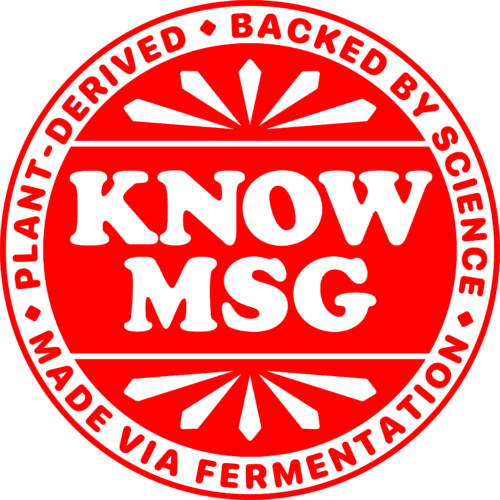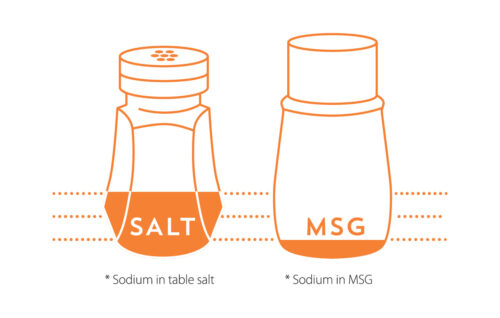Air-Fryer Greek Yogurt Everything Bagel Bites
I’ve been making this spin on Greek yogurt infused bagels for years – kids and adults alike swoon for the texture, flavor and quick cooking time of these greek yogurt, air fryer bagel bites.

You probably heard somewhere that MSG is bad news. It’s terrible for you… right?…. or at least that’s what you were led to believe! It turns out lots of folks have been duped into thinking this umami bomb of flavor was a no-no. But in fact, this ingredient found on dinner tables all over the world deserves a seat at the American table. Nutrition professionals (this one included) subscribed to the “No MSG” school of thought for decades, but never really questioned the logic or asked to see the science behind it – which is very unlike a nutrition professional. However, after reading up on the current research and the #ResearchFail from 50 years ago here’s what I’ve learned.
What Is MSG?
The term “umami” gets endless accolades for being the key to savory and deep flavor profiles. The once elusive 5th sense of taste can be found in soy sauce, mushrooms, broths and meats. MSG and umami are more closely related than you might think – MSG is umami seasoning.
MSG stands for monosodium glutamate and it’s a dynamic duo of sodium and glutamate, an amino acid found naturally in foods like Parmesan cheese, tomato, mushrooms and soy sauce. MSG is extracted from seaweed or fermented sugar and combined with sodium to make the tiny white crystals used to season food. This combo sends your taste buds to flavor town and despite popular belief, there’s not a ton of sodium coming along for the ride. In fact, MSG contains 2/3 less sodium than table salt and using it in place of some of the salt in recipes can slash the salt by 30 to 40 percent.

The Tale of Chinese Restaurant Syndrome
The alleged dangers of MSG began trending in late 1960s. In a letter to the editor printed in the New England Journal of Medicine, the writer reported unpleasant symptoms he experienced after eating at Chinese restaurants. Headaches, neck pain, skin flushing and tummy woes – a condition that HE coined Chinese Restaurant Syndrome. This was followed by a small amount of poorly executed research. One study included injecting lab rodents with an exorbitant amount of MSG in their abdomen which didn’t go so well for the rodents, after this news got out MSG became a four-letter word.
MSG Gets A Reboot
When you look globally, MSG does not seem to be causing the health crisis many feared. While it is possible that some people may have an intolerance to MSG, the unavoidable truth remains that it continues to be a seasoning staple in other countries throughout the world – and they aren’t complaining of a headache! In fact, in light of recent review of the research (or lack thereof) MSG was removed as a cause of headaches from the International Headache Society list of causes in 2018. Chefs in the US are catching on to the flavor boosting powers of MSG with many unapologetically using it in their recipes and placing it on customer tables along with the salt and pepper shakers. Some home cooks (myself included) are adding MSG to their spice racks.
What Foods Contain MSG?
MSG has been an ingredient in many foods in the US for years – only no one really talks about it. Popular nacho cheese tortilla chips, canned foods, snack foods, seasoning blends and bouillon seasonings contain MSG –check the ingredient lists. The fact of the matter is, many not-so healthy and highly processed foods contain it and just because MSG getting the all clear, doesn’t make chips good for you. MSG can be used to boost the flavor in healthy foods you prepare at home. Look for MSG at Asian markets or buy online; add a few shakes to soups, sauces, salad dressings, roasted vegetables and burgers.
Bottom Line: MSG may not be for everyone but it certainly doesn’t deserve to be on the black list of American cuisine. Using it as a seasoning can unlock the greatness of umami and may also be helpful in sodium reduction.
I’ve been making this spin on Greek yogurt infused bagels for years – kids and adults alike swoon for the texture, flavor and quick cooking time of these greek yogurt, air fryer bagel bites.
Bargain shopping guide for all things backyard.
Healthy, nourishing food doesn’t have to be expensive. Here are some stellar examples.
5 ways to love chickpeas.
Sign up for my newsletter to receive the latest updates!
© 2023 Dana White Nutrition, Inc.
Site Design by Eclectic Electric | Powered By WP In the Cloud